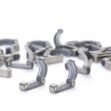Bayer, the manufacturer of the Essure intrauterine device (IUD) along with numerous other pharmaceutical products inside and outside the area of contraception, was recently hit with a lawsuit in New York state court. The lawsuit titled Dains v. Bayer, et al. alleges that the plaintiff was seriously injured as a result of inherent defects in the Essure IUD. The Dains plaintiff is just one in a long line of complaints brought against Bayer concerning problems with the Essure contraceptive device.
Essure is an IUD. IUDs are a type of long-term conception that typically take the form of a small T-shaped device implanted into the uterus to either block sperm from fertilizing an egg or prevent eggs from implanting in the uterine lining. Patients appreciate the ease of IUDs because they do not require invasive surgery, taking regular pills, or other upkeep once installed. Essure in particular operated by causing scar tissue to form in the fallopian tubes, preventing sperm from reaching the egg and thus preventing pregnancy.
According to a number of studies (and as alleged by the instant plaintiff), the Essure IUD was dangerously defective as designed. Many problems with the device stem from the material used to construct the device. Many people have allergic reactions to the nickel-titanium alloy, and the inserts were found to degrade and release nickel into the fallopian tubes after installation. Patients can experience rashes, itching, and hives. The device was also found to be defective as designed in other ways. Aside from the risk of an allergic reaction, Essure was prone to fracture and break, become dislodged, or otherwise perforate the surrounding area, allowing pregnancies as well as causing abdominal pain, bleeding, vaginal infections, and even death. The instant plaintiff experienced a number of these complications. Between 2002 and 2017, the U.S. Food and Drug Administration received close to 30,000 adverse event reports concerning the Essure device. Bayer finally announced it would discontinue the device as of 2019.
The recent complaint follows years of allegations brought against Bayer claiming that the Essure birth control implants are dangerously defective. In 2020, Bayer agreed to pay around $1.6 billion in settlements to injured patients and families. Women claimed that the IUD was prone to perforating the fallopian tubes or to come loose entirely, which caused pain and other serious side effects. At the time, the settlement was thought to cover around 90% of the nearly 39,000 filed and unfiled cases. The terms of the settlements were confidential, but it was generally understood that Bayer agreed to pay without admitting to any liability or wrongdoing.
The Essure is far from the only IUD to face allegations concerning dangerous defects. Since the 1970s, several large corporations have paid out billions of dollars to injured victims suffering from IUD complications. G.D. Searle & Co. settled hundreds of claims in the 1980s based on allegations that the Copper-7 IUD caused ectopic pregnancies, perforation of the uterus, pelvic inflammation, and other complications. A.H. Robins Company went bankrupt paying close to $3 billion to victims of defective Dalkon Shield IUDs in the 1990s. Bayer, in fact, is still facing ongoing litigation pertaining to a different line of contraceptives, the Mirena IUD. Women harmed by the device claim that Mirena causes perforation of the uterus, organ damage, and the creation of pseudotumors.
Despite their checkered history, IUDs have continued to grow in popularity. Well-designed IUDs are, ostensibly, safe for women, although the problem lies in divining whether an IUD now deemed safe will be discovered to have some unknown side effects down the line. Even Planned Parenthood recommends IUDs as “very safe for most people.” Ideally, the pharmaceutical companies will have learned from the lessons of the past and will only sell properly-tested, truly safe IUDs from this point. For patients who have experienced complications due to defective IUDs previously marketed, however, or who are harmed by new defects yet to be discovered, the manufacturers can and should be held liable.






